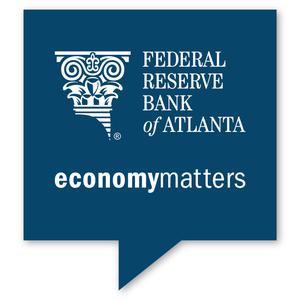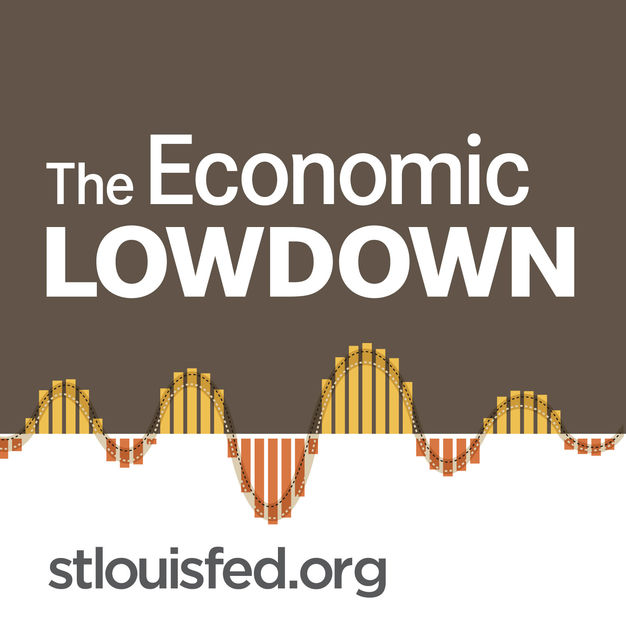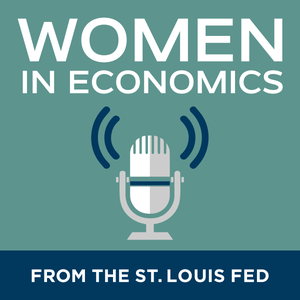
Timely Topics
St. Louis Fed
St. Louis Fed experts discuss economic issues
- 7 minutes 36 secondsJanuary 2025 Beige Book Interview – Little Rock
The St. Louis Fed’s Matuschka Lindo Briggs, senior vice president and regional executive of the Little Rock Branch, and Charles Gascon, economist and research officer, offer economic insights from the latest Beige Book release highlighting the Arkansas region and the Eighth District.
16 January 2025, 3:37 pm - 11 minutes 35 secondsHow Much U.S. Currency Is Held Abroad and Why
What happens if U.S. dollars are spent overseas and stay there? Senior economic policy advisor Christopher Neely analyzes how much U.S. currency is held abroad and if that’s a problem or an advantage for the U.S. Neely discusses the level of U.S. banknotes kept overseas and explains why those dollars can act as an interest-free loan.
6 December 2024, 3:39 pm - 8 minutes 47 secondsDecember 2024 Beige Book Interview – Little Rock
The St. Louis Fed’s Matuschka Lindo Briggs, senior vice president and regional executive of the Little Rock Branch, and Charles Gascon, economist and research officer, offer economic insights from the latest Beige Book release with a focus on the Arkansas region and the Eighth District.
5 December 2024, 3:27 pm - 7 minutes 57 secondsOctober 2024 Beige Book Interview – Little Rock
The St. Louis Fed’s Matuschka Lindo Briggs, senior vice president and regional executive of the Little Rock Branch, and Charles Gascon, economist and research officer, discuss economic insights from the latest Beige Book release with a focus on the Arkansas region and the Eighth District.
24 October 2024, 2:50 pm - 13 minutes 28 secondsHow Does Income Affect Where Students Go to College?
Even if they have good grades and excellent standardized test scores, are low-income students more or less likely to accept an offer letter from a highly selective college? While the question is simple, the answer is complex and at times surprising. “What we see is that they instead end up enrolling in a less-selective college despite being accepted into a top college,” says St. Louis Fed Economist Ricardo Marto says. In this episode, Marto previews his forthcoming research into how income can affect where students apply and ultimately which offer letters they accept.
10 October 2024, 2:59 pm - 7 minutes 27 secondsSeptember 2024 Beige Book Interview – Little Rock
The St. Louis Fed’s Matuschka Lindo Briggs, senior vice president and regional executive of the Little Rock Branch, and Charles Gascon, economist and research officer, discuss economic insights from the latest Beige Book release with a focus on the Arkansas region and the Eighth District.
5 September 2024, 2:48 pm - 15 minutes 23 secondsWhat an Expanded Beveridge Curve Could Tell Us about Soft Landings
What is a soft landing, and how do we know if one is possible? In this episode, St. Louis Fed Economic Policy Advisor Paulina Restrepo-Echavarría unpacks that question and explains the importance of the Beveridge curve, an economic indicator that represents the relationship between the unemployment rate and the job openings rate. She’ll also discuss how a historic change in job openings prompted her and a colleague from the Dallas Fed to explore how the Beveridge curve could be expanded to analyze whether a soft landing is possible.
29 August 2024, 2:31 pm - 7 minutes 18 secondsJuly 2024 Beige Book Interview - Little Rock
The St. Louis Fed's Matuschka Lindo Briggs, senior vice president and regional executive of the Little Rock Branch, and Charles Gascon, senior economist, discuss economic insights about the Arkansas region and the Eighth District from the latest Beige Book release.
18 July 2024, 3:00 pm - 8 minutes 21 secondsAcross Generations: Income, Home Ownership and Where People Live
What patterns emerge when you zoom out and look at more than 80 years of data on income and housing? The answer is both nuanced and surprising. “Many members of these newer generations seem to be starting off their careers in smaller metro areas,” said St. Louis Fed economist Victoria Gregory. “These early in life location patterns are interesting because location choice is usually driven by job opportunities and affordability concerns.” In this podcast, Gregory reveals what did and didn’t change regarding income, home ownership rates and, ultimately, where people decided to live across four different generations.
14 June 2024, 2:00 pm - 6 minutes 11 secondsMay 2024 Beige Book Interview –Arkansas and the Chicago Fed
The St. Louis Fed’s Matuschka Lindo Briggs, senior vice president and regional executive of the Little Rock Branch, and Thomas Walstrum, senior business economist at the Chicago Fed, discuss their insights about economic conditions in Arkansas and the Fed’s Seventh District.
30 May 2024, 2:47 pm - 10 minutes 1 secondHow Population Decline Affects Productivity
How does population decline affect both short- and long-term economic growth? “There is a concern among developed countries that this may have an impact on productivity,” said Juan Sanchez, senior economic policy advisor at the St. Louis Fed. “But there is not a lot of research on that.” In this podcast episode, Sanchez discusses his research about how population decline impacts productivity, a key driver of economic growth.
15 May 2024, 3:22 pm - More Episodes? Get the App
Your feedback is valuable to us. Should you encounter any bugs, glitches, lack of functionality or other problems, please email us on [email protected] or join Moon.FM Telegram Group where you can talk directly to the dev team who are happy to answer any queries.
 Economic Development
Economic Development
 Economy Matters Podcast
Economy Matters Podcast
 Economic Lowdown
Economic Lowdown
 Pacific Exchanges
Pacific Exchanges
 Twice Around
Twice Around
 Women in Economics
Women in Economics